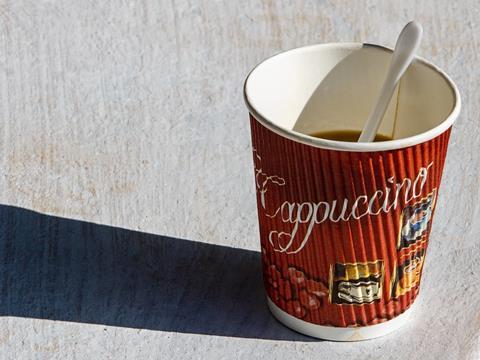
Siegwerk, Greiner Packaging, and Krones have teamed up in an initiative set on deinking and recycling polypropylene and polystyrene cups via hot caustic washing – and now call for design-for-recycling guidelines to be updated in line with their results.
Demand for transparent and white recyclates are thought to have increased in line with brand owner commitments; and the upcoming Packaging and Packaging Waste Regulation is expected to mandate recycled content in all plastic packaging.
Therefore, design-for-recycling guidelines have begun to discourage direct print, in-mould labels, or any other decorations that cannot be physically separated from rigid polyolefin or polystyrene packaging.
Despite these developments, Siegwerk and Greiner launched a project to examine hot caustic washing – a process already used in PET bottle recycling processes and gaining popularity amongst polyolefin and polystyrene recyclers – as a recycling method for such containers.
The process is capable of removing labels and cleaning plastic flakes to remove odour, and the companies believe that the process could also be beneficial for ink removal. In turn, it is anticipated to produce high-quality white recyclates without requiring packaging manufacturers to alter their ink formulation or print design.
According to laboratory tests conducted at Siegwerk’s facilities, applying this process to polypropylene and polystyrene cups resulted in complete ink removal. Their ΔE values were said to range between 0.5 and 1.5.
In order to test the process under industrial conditions, the partners joined forces with Krones and utilized its pilot plant for large-scale washing tests. Processing 500kg of mixed-colour polypropylene cups, the companies report that the standard offset printing inks were removed without deviating from standard washing conditions.
They add that water treatment tests, conducted in line with DIN SPEC 91496 procedure, revealed how inks could be readily flocculated out of the lye to close the loop on the washing solution.
Now Siegwerk, Greiner, and Krones state that design-for-recycling guidelines should ‘evolve with technological advancements in recycling’ and ‘reflect the most efficient and sustainable routes to a circular packaging economy’. In line with a position paper released by EuPIA, they encourage a broader assessment of packaging deinkability under standard hot caustic conditions, and for the corresponding test standard published under DIN SPEC 91496 to be adopted.
“Caustic hot washing is becoming essential in plastic recycling,” explained Michael Auburger, product specialist recycling solutions at Krones. “Efficient removal of filling good residues, adhesives and inks requires more intense washing systems, particularly when targeting consumer packaging.”
“Design for Recycling Guidelines are important tools to enable a Circular Economy,” continued Anita Gruber, global project manager Circular Economy at Greiner. “However, it is even more important to continuously review them and develop them further if necessary.
“As converters, we aim to design our packaging in the best possible way. We also believe that the entire value chain must work together to drive positive developments.”
“Indeed, achieving packaging circularity in Europe isn’t just about changing upstream design,” added Andrey Charkovskiy, senior business partner recycling and polymers at Siegwerk. “The whole value chain has to work together and Design for Recycling Guidelines must be continually reassessed to recognize the latest in recycling technology.
“Cross-value chain industry initiatives like creation of the standardized deinking test protocol DIN SPEC 91496, are essential and need to be acknowledged on the European level.”
The companies assert that similar initiatives should be held for flexible packaging, which faces similar issues with non-deinkable systems. In a previous partnership, Siegwerk joined forces with Wildplastic and the Hamburg University of Technology to deink plastic packaging waste before it enters the recycling extrusion process.
Back in 2022, Siegwerk subsidiary polycirQ was nominated for a Sustainability Award under the pre-commercialized Driving the Circular Economy category for its technology designed to remove printing inks from LDPE and PP films.
The following year, Siegwerk’s printable CirKit ClearPrime delamination and deinking primers were nominated under the commercialized Recyclable Packaging category – as was Flint Group with its Evolution Deinking Primer under the pre-commercialized Driving the Circular Economy category.
If you liked this article, you might also enjoy:
The Lidl approach to packaging sustainability
How did Brazil achieve its 100% aluminium can recycling rate – and can it be replicated in the EU?
Experts have their say on the EU’s Packaging and Packaging Waste Directive revisions
A deep dive into the most important packaging sustainability trends and solutions














No comments yet